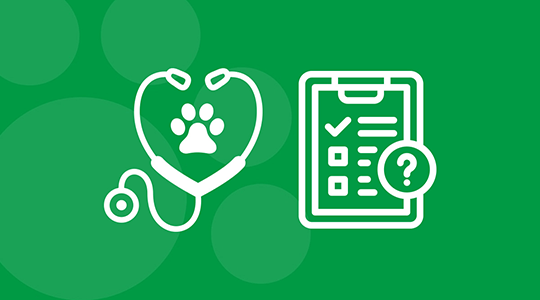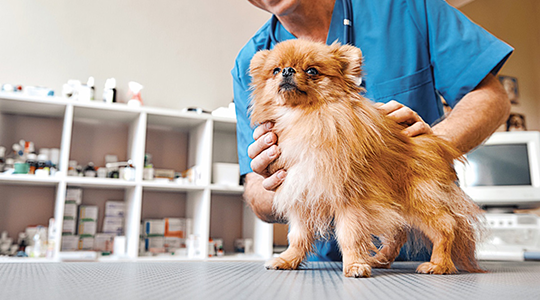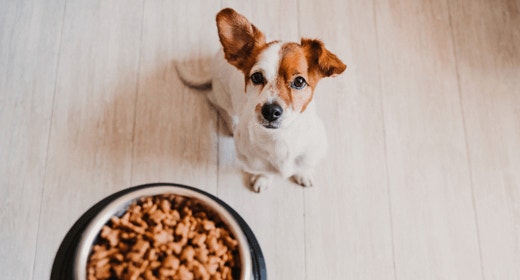
The Big Day: Puppy's First Vet Visit
Congratulations on welcoming home your new puppy! An important part of keeping them healthy is taking your furry new friend to the vet — and your new puppy's first visit to the vet will probably be more than just a quick hello. We're here to help you and your puppy prepare for this important milestone.
Puppy's First Vet Visit: What to Expect, How to Prep and Tips for the Big Day
Get all the info from veterinarian Dr. Katy Nelson as she talks about important details new pet parents should know.
Your Puppy's First Vet Visit Checklist
Now that you've brought your puppy home and started getting them settled, let's dive into everything you need to know about taking your new puppy to the vet. A puppy's first vet visit is usually around the age of two to three weeks for an initial health check, and then between six and eight weeks to begin vaccinations and parasite prevention. No matter how old your puppy is, plan to take them to your vet within three days of coming home with you.
What to Bring to Your Puppy's First Vet Visit
A little prep goes a long way for a new-puppy vet visit. First, find out what the breeder or shelter has already done for your puppy. You should have documentation listing if your puppy has received:
- Vaccinations
- Deworming medication
- Heartworm preventative
- Tail docking and/or dewclaw removal, depending on breed
Your veterinarian will need all this information, along with the puppy's birth date. Bring all of your puppy's paperwork and a fresh stool sample to test for parasites.

Prepare a list of questions. This is a great time for new pet parents to build a relationship with the vet and learn more about how to best look out for a growing puppy's health. Some questions to ask may include:
- What vaccinations does my puppy need, and when?
- When can my puppy be around other dogs?
- Are there any health issues I should watch out for with my puppy’s breed?
- What parasite protection do you recommend?
- When should I spay or neuter my puppy?
- Should I microchip my puppy?
- How often should I bring my puppy in for vet visits?
If you have any questions about exercise, training (house training, leash training, crate training, etc.), socialization, types of food or meal schedules, dental care/teething, or general questions pertaining to your puppy's health, your puppy's vet visit is a smart time to get expert advice.
How to Bring a Puppy to the Vet
When it's time to take your puppy to the vet, secure their crate in your vehicle with seat belts and then place your puppy inside. If the crate doesn't fit, consider purchasing a dog seat belt specifically designed to restrain and protect your puppy in case of an accident. Don't leave your little puppy free to roam the vehicle while you drive.
Waiting Room Etiquette for Puppies
When you arrive at the vet, it's important to carry your puppy into the doctor's office and to avoid interacting with any other animals in the waiting room. Even just rubbing noses with another dog can make an unvaccinated puppy sick. Making sure your puppy has a chance to relieve themselves before entering the waiting room can help them feel calmer while you wait.

What to Expect During the Vet Visit
After greeting you, your vet will likely begin examining your pup as they continue to converse and answer your questions. Your vet will check your puppy's weight and temperature and examine their heart, lungs, ears, genitals, eyes, nose, skin, anal region, mouth and gums for basic and breed-specific abnormalities.
Parasite Treatment and Prevention
Depending on your puppy's stool exam, your vet may begin deworming treatment to address any internal parasites; keep in mind that it's very common for puppies to have roundworms or hookworms.
Your vet may recommend a plan for flea prevention and tick prevention, depending on your puppy’s age and where you live.
Vaccinations
They'll also review your puppy's records and plan what vaccines are needed; your pup may receive their first vaccination for DAP (distemper, adenovirus and canine parvovirus), a rabies vaccine and a Bordetella (kennel cough) vaccine. Your vet may recommend additional vaccinations based on geography, lifestyle and exposure to other dogs. They’ll likely ask that you return in two to four weeks to booster the vaccines until your puppy reaches a certain age.
After all your questions are answered, you and your puppy will check out and head home. The cost of a puppy's first vet visit will vary based on where you live, vaccinations received, your puppy’s health, etc. Be prepared to spend $100 or so, but plan to call your vet in advance for a more precise estimate. Learn more about the cost of annual vet visits.
Signs Your Puppy Needs Immediate Veterinary Care
If you notice any of these signs, take your puppy to the vet right away:
- Allergic reactions or swelling around the face
- Hives (most easily seen on the belly or face)
- Eye injuries
- Respiratory problems
- Signs of pain, including panting, labored breathing, increased body temperature, lethargy, restlessness or loss of appetite
- Suspected poisoning
- Open wound
- Seizures, fainting or collapse
- Snake bites
- Thermal stress (either too hot or too cold)
- Trauma, like if they’re hit by a car
- Vomiting or diarrhea more than two or three times within an hour, even if they seem otherwise fine
Keeping a close watch on your puppy's health, growth, and development and building a strong relationship with your vet are two great ways to help your little friend grow into a healthy, well-cared-for adult dog.




